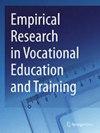全球青年劳动力发展中的职业干预服务考虑因素:政策、研究和实践的共识
IF 3.1
Q2 EDUCATION & EDUCATIONAL RESEARCH
Empirical Research in Vocational Education and Training
Pub Date : 2019-02-23
DOI:10.1186/s40461-019-0080-4
引用次数: 0
摘要
尽管在教育和职业成就、收入潜力以及其他社会心理风险方面一直存在差距,导致全球某些人群长期处于边缘化状态,但有效的职业教育和干预措施的要素尚未达成一致。因此,我们寻求政策、研究和实践领域的专家达成共识。我们详细介绍了最近与全球青少年职业和劳动力发展领域的政策、研究和实践专家进行的德尔菲研究的过程和结果,这些专家接受了调查,了解了他们对生态视角、需求评估、培训师准备、参与者课程、课程实施和项目评估等概念的看法--这些概念是最近对这些领域的文献进行综合归纳的六个新兴领域(Nassar 和 Al-Qimlass,《职业建设者:有效的全球青少年职业和劳动力发展的关键要素》,RTI Press,Research Triangle Park)。RTI Press,Research Triangle Park,2017a)。我们的德尔菲研究得出了 199 项共识声明,随后归纳为 28 个主题,或有效全球劳动力发展计划的考虑因素。最后,我们提出了一些影响,包括针对主要利益相关群体的实施策略。本文章由计算机程序翻译,如有差异,请以英文原文为准。
Considerations for career intervention services in global youth workforce development: consensus across policy, research, and practice
As yet, despite ongoing gaps in educational and career achievement, earning potential, and other psychosocial risks that perpetuate marginalization among certain populations globally, elements of effective career education and interventions have yet to be agreed upon. Thus, we sought consensus among experts across the domains of policy, research, and practice. We detail the process and results of a recent Delphi study conducted with global youth career and workforce development experts across policy, research, and practice domains who were surveyed about their opinions regarding concepts such as ecological perspectives, needs assessment, trainer preparation, participant curriculum, curriculum delivery, and program evaluation—the six emergent areas of a recent comprehensive synthesis of the literature across these domains (Nassar and Al-Qimlass, in Career builders: key components for effective global youth career and workforce development. RTI Press, Research Triangle Park, 2017a). Our Delphi study yielded 199 consensus statements, subsequently organized into 28 themes, or considerations, for effective global workforce development initiatives. In conclusion, we provide implications, including implementation strategies for key stakeholder groups.
求助全文
通过发布文献求助,成功后即可免费获取论文全文。
去求助
来源期刊

Empirical Research in Vocational Education and Training
Social Sciences-Education
CiteScore
3.40
自引率
7.70%
发文量
9
审稿时长
13 weeks
期刊介绍:
The main focus of this journal is to provide a platform for original empirical investigations in the field of professional, vocational and technical education, comparing the effectiveness, efficiency and equity of different vocational education systems at the school, company and systemic level. The journal fills a gap in the existing literature focusing on empirically-oriented academic research and stimulating the interest in strengthening the vocational part of the educational system, both at the basic and higher education level.
 求助内容:
求助内容: 应助结果提醒方式:
应助结果提醒方式:


